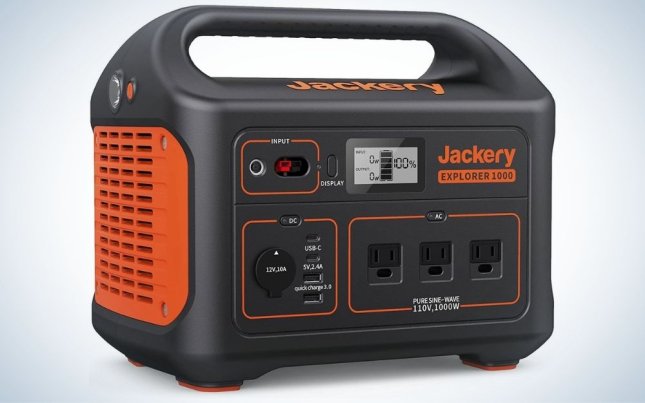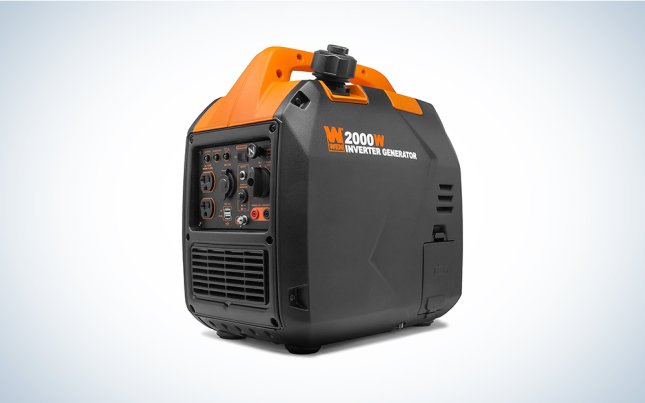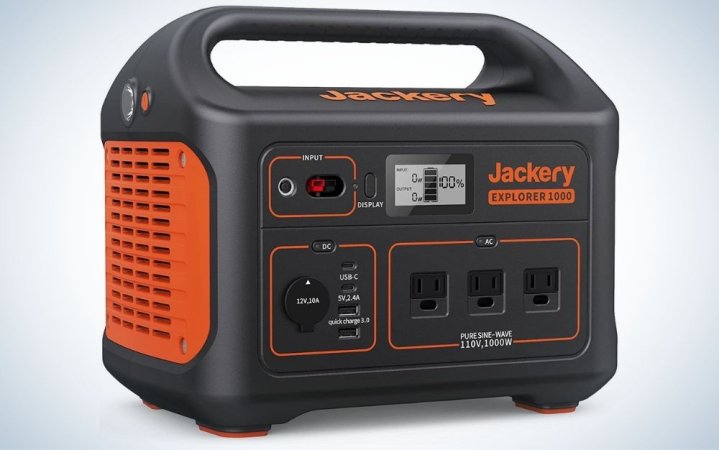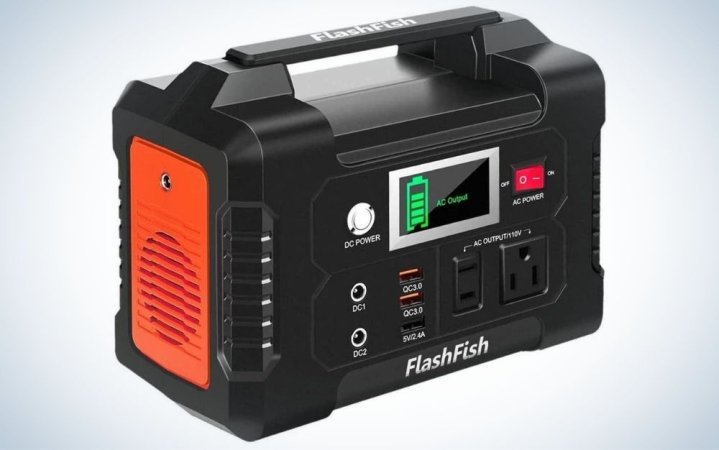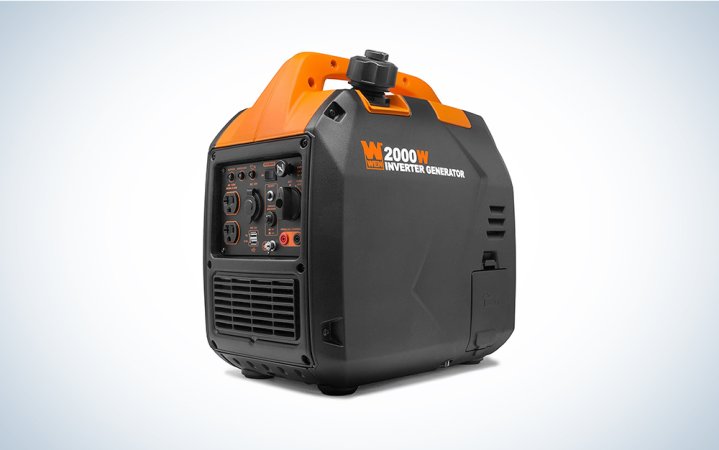We may earn revenue from the products available on this page and participate in affiliate programs. Learn more ›

Electric generators can save you in an emergency or just make life a lot more pleasant when you’re off the grid. Our daily lives depend on electricity, so when the power goes out, it can be more than a simple inconvenience; it can be a catastrophe. Appliances won’t work. Medical equipment like CPAP machines won’t work. And, worst of all, without power, there is no internet. Electric generators can power the entire home. A small generator can keep the appliances in an RV working. And indoor-friendly, battery-powered electric power stations keep laptops and floor lamps shining bright all through the night. No matter what situation you’re in, the right emergency generator gives you the power options needed to survive comfortably. If you’ve got hurricane preparedness on your mind, you can use one during bad storms. You can use one when camping or tailgating. You can even use the best electric generator to keep an outdoor event going strong all night long.
- Best for RVs: Westinghouse Outdoor Portable Generator
- Best for overnight emergencies: Jackery Portable Power Station Explorer 1000
- Best for CPAP machines: Flashfish Portable Power Station
- Best for devices: Goal Zero Yeti 200X Portable Power Station
- Best for small appliances: WEN 56225i 2250-Watt Portable Inverter Generator
How we chose the best electric generators
To spark our search for the best electric generators, we looked at reviews, recommendations, conducted user testing, and performed heavy research. We also took knowledge from other generator stories—like this one on inverter generators—and applied it here.
The best electric generators: Reviews & Recommendations
First, pick the type of generator you want—gas generator or solar generator—and then find the generator that provides enough electricity for your needs. Do you want to power the entire house or just an iPhone? The best electric generator will be the right size at the right price.
Best for RVs: Westinghouse Outdoor Portable Generator
Dependable Gas Generator
Why it made the cut: Power your fridge or your RV with this generator that’s “just-right” when it comes to power and cost.
Specs
- Weight: 109 lbs.
- Watts: 3,600 watts
- Hours of power: 14 hours on 1,000 watts
- Number of outlets: 4
Pros
- Starts easily
- “Just-right” in power and cost
- Can power select household appliances
Cons
- Heavy
The Westinghouse gas generator offers 3,600 running watts, which is more than enough for RV appliances, gadgets, and lights. It can use gasoline or propane and you’ll get 14 hours of power on a full tank when running about 1,000 watts. It sits right in the middle of options in terms of power output and cost, not too little or too cheap, and not overpowered or overpriced. It comes ready for campers and RV plugs and outlets. While it can’t be used as a whole-home generator if the home is small, it’s designed for providing backup power for a few select household appliances like refrigerators and heat pumps. It starts easily and Westinghouse makes dependable generators that work when it matters most.
Best for overnight emergencies: Jackery Portable Power Station Explorer 1000
Long Battery Power
Why it made the cut: This lightweight and powerful generator can keep everyone connected while powering the fridge.
Specs
- Weight: 22 lbs.
- Wattage: 1000 watts
- Hours of power: 65 hours and up
- Number of outlets: 3
Pros
- Easy to carry
- Has less of an impact on the environment
- Reliable
- Can be charged via solar power
Cons
- Expensive
The Jackery Explorer 1000 station is a powerful source of electricity and a great substitute for a gas emergency generator. On a full charge, the 1,000-watt battery brick can keep a laptop going for over 24 hours and a mini-fridge running for 9 hours. It’s ideal for keeping everyone safe and everything connected during an overnight blackout. It’s also easy to carry on camping trips, weighing only 22 pounds. It can be hooked up to solar panels (not included) but as with most solar generators, it takes a while to charge—about 7 hours of direct sunlight to get to 80-percent power. It’s not the cheapest power station, but you’re paying for extra wattage-hours. For families on a dark, stormy night, it’s a reliable piece of safety equipment.
Best for CPAP machines: Flashfish Portable Power Station
Breathe Easier
Why it made the cut: Breathe easy knowing that this generator can keep your CPAP running for two nights.
Specs
- Weight: 4.08 lbs.
- Wattage: 200 watts
- Hours of power: Up to 30 hours depending on device
- Number of outlets: One
Pros
- Can be charged via solar power
- Quiet
- Lightweight
Cons
- Only for smaller devices that require less power
Those suffering from sleep apnea understand the need for a reliable source of electricity through the night. Most CPAP breathing machines run on between 40 and 60 watts. The Flashfish Portable Power Station can keep your breathing device going through at least two nights on a full charge. This is a lower-wattage power station, so don’t expect to run power tools or hair dryers on the 200-watt generator. The power station is quiet, another plus for quality sleep health and weighs only five pounds, making it great for traveling and camping. For sleep apnea breathing machines, or simply to keep iPhones fully charged, this little power station does a remarkable job.
Best for devices: Goal Zero Yeti 200X Portable Power Station
Easy To Use
Why it made the cut: Stay online when the power’s out with this portable generator that packs a punch.
Specs
- Weight: 5 lbs.
- Wattage: 200 watts
- Hours of power: Up to 42 hours depending on device
- Number of outlets: One
Pros
- Lightweight
- Quick to charge compared to other generators
- Can be charged using solar power
Cons
- Decent at charging larger devices
The Yeti power station offers 200Wh of electricity. It’s a great tool for charging and using handheld electronics like laptops (50Wh) and GoPro cameras (5Wh). It has one AC outlets, 2 USB-A ports, and 2 USB-C ports. The Yeti generator charges to full capacity in about five hours when plugged into the wall and about 2 hours when plugged into a car. It is on the lighter side, weighing just under 5 pounds, but it can’t charge an entire cabin. It’s a solid choice for keeping gadgets going for 12 hours or more. And, it can power a router for 8 hours, meaning you can stay online when the power’s out.
Best for small appliances: WEN 56225i 2250-Watt Portable Inverter Generator
Cheap Gas Generator
Why it made the cut: You don’t have to pay big bucks to power your coffee maker, mini fridge, or microwave when the power’s out.
Specs
- Weight: 48.5 lbs.
- Wattage: 2250 watts
- Hours of power: 7 hours of half load run time
- Number of outlets: Two
Pros
- Inexpensive
- Can keep a mini fridge charged for around 10 hours
- Eco mode and fuel shut-off built-in
Cons
- Not that many outlets compared to other generators of similar wattage
- Heavy
For day trips or night emergencies, this little, inexpensive 48.5-pound inverter generator is a simple and effective way to add power anywhere. At less than $450, this cheap gas generator will surprisingly power small appliances. This is more powerful than most battery-powered stations on the list, but less expensive than big, heavy-duty gas generators. It can’t power the entire house, but it’s good for running a mini fridge and lights for hours. This generator is a cheap emergency device that will get you through a rough night.
What to consider buying the best electric generators
Electric generators are complicated machines. Knowing the various types of generators and how they work will ensure your generator or power station of choice offers efficient, safe electricity whenever and wherever you need it.
Do you need a gas-powered electric generator or a battery-powered generator?
Gas-powered generators can be big and noisy, yet powerful. These heavy beasts turn gasoline into controllable lighting, and that’s no easy task. The bigger gas generators are used as whole-house generators and can provide efficient backup electricity when the power goes out. Some can be wired into your home’s electricity for a seamless transfer of power. But whole-house generators are not cheap and they often need to be installed by professionals. Smaller, portable gas generators are great at keeping major appliances running, such as refrigerators and air conditioning units—but they need space to give off deadly carbon monoxide gas. (Never use them indoors, even in a garage with the door open.)
Battery-powered electric generators, meanwhile, are often called power stations because they’re not actually making the electricity, simply storing it. They’re becoming more and more popular. These generators provide just enough electricity for phones, laptops, TVs, and other devices that are not as wattage-hungry as big household appliances like washing machines. They are cheaper, lighter, and much more portable than gas generators. And they can safely be used inside the home.
If all you need is a power source for charging gadgets and staying connected to the outside world, a portable electric power station that runs on a rechargeable battery is the best solution.
Understanding the backup-generator power rating
Looking at the stats and specs of even the most basic generator can be confusing. The two numbers to look for are running wattage and surge or starting wattage.
Running wattage refers to the power needed to keep a device working. Because most appliances need an extra boost of power to start and get up to speed, the generator will also list a starting wattage to show how much juice you need to get things going.
For a whole home generator, you may need a unit that offers up to 8,000 watts. This will run most appliances and essential electronics. But if all you need is a portable generator for charging devices, you can survive on a generator that only offers 100 watts.
Make a list of all the appliances you want to run if/when the power goes out. Use this as a rough guide to predict how much wattage you’ll need. Give yourself plenty of wiggle room by opting for a more powerful generator.
Portable power stations will often list wattage hours (Wh). This means if a generator is rated at 200Wh, it can run a 20-watt device for 10 hours. Keep in mind that the specs listed apply only if the generator is fully charged.
Pay attention to charge time and fuel for the best electrical generator
Besides power output, the most important thing to look for in a battery-powered electric generator is the charge time. Many power stations can either be plugged into the wall or car outlet, or use solar panels to fill up the battery. But it can take time; a 160-watt battery needs at least five hours of consistent AC-wall-outlet power for a full charge. And when disaster strikes, you won’t have five hours to spare. If you go for a battery-powered generator, be diligent about charging the station. Solar generators take even longer. Plan accordingly.
Gas generators will need fuel, of course. Many can be filled with standard gasoline, but propane tanks will last longer. Whole-home generators, and some portable gas generators, can be connected to the home’s natural gas line for dependable power. Natural-gas generators are more efficient and more earth-friendly than gasoline generators. Whatever fuel source you use, stock up and be ready for whatever weather comes your way.
Are portable electric generators really portable?
Even if the gas generator is advertised as portable, it may still require some muscle power to maneuver. These gas generators can weigh hundreds of pounds, and even with wheels and handles, it can be grueling to lug them around on camping trips.
Battery-powered energy stations are much more portable, weighing less than 20 pounds. Travel generators may weigh only two pounds and have enough power to charge a phone nearly ten times.
What is a power inverter and how does it help?
An inverter generator takes DC power, converts it to AC power, and then converts it again into DC power. Why the back and forth? To put it simply, the power will be more consistent and efficient when inverted from DC to AC and back to DC. This is ideal for sensitive electronics such as laptops. Inconsistent power or power surges can wreak havoc on high-tech devices. The clean power output of an inverter generator is safer. The downside: Inverter generators cost more than standard gas generators. But they are also quieter than gas generators and more efficient, so it may be well worth the money.
Finally, noise is also a crucial stat for gas generators. Loud generators coughing up 90 decibels can ruin an outdoor event. Battery-powered energy stations are quiet because they lack an engine, but they also lack the big power output of gas generators.
FAQs
To power a house, you’ll need at least 4,000 watts of electricity. That will run basic appliances and electronics without too much trouble. But for a complete, whole-home generator, you may need up to 8,000 watts. These natural-gas generators can run all the lights, heating/cooling systems, and household appliances of a mid-sized home. They won’t be cheap, but they do provide reliable energy and can hook into your home’s existing natural gas line. If all you want is a power supply for electronics like laptops or CPAP machines, you’ll only need about 200 watts to get through a few nights. The size of the generator depends on what you want to operate. Hair dryers and blenders are notoriously high-wattage machines. Mini-fridges and electric grills won’t need nearly as much power.
Natural-gas generators are the most efficient for powering an entire house. Gasoline and propane generators are the most efficient for RVs. But for keeping TVs and computers running, the most efficient power supply will be a rechargeable power station like the Jackery Portable Power Station Explorer 1000. These easy-to-use power stations keep phones and tablets running without burning fuel. They are also quiet and safe to use indoors.
Choose an electric generator by considering all of your options. Gas generators are the standard method of bringing power to the powerless, but the fumes, weight, and noise prevent these big engines from being in-home power supplies or good portable camping generators. Electric, rechargeable power stations provide less wattage but are safe and ideal for laptops, TVs, phones, and other electronics. And if you want a whole-home generator to be the backup power for all appliances, you’ll need an 8,000-watt natural-gas generator. The type of electric generator you need depends on what you’ll need to keep running when the power goes out.
Final thoughts on the best electric generators
- Best for RVs: Westinghouse Outdoor Portable Generator
- Best for overnight emergencies: Jackery Portable Power Station Explorer 1000
- Best for CPAP machines: Flashfish Portable Power Station
- Best for devices: Goal Zero Yeti 200X Portable Power Station
- Best for small appliances: WEN 56225i 2250-Watt Portable Inverter Generator
The best generator will be a powerful resource that’s as dependable as it is efficient. The size and type of electric generator will vary based on how you want to use it. Big gas generators are great for big appliances. Power stations are great for small devices. And natural gas generators are great for keeping the entire home running smoothly. Whatever generator or power supply you choose, make sure it’s ready to work whenever you need it—that means keeping it fueled up or keeping the battery charged. The best electric generator can be a powerful resource if used correctly.
